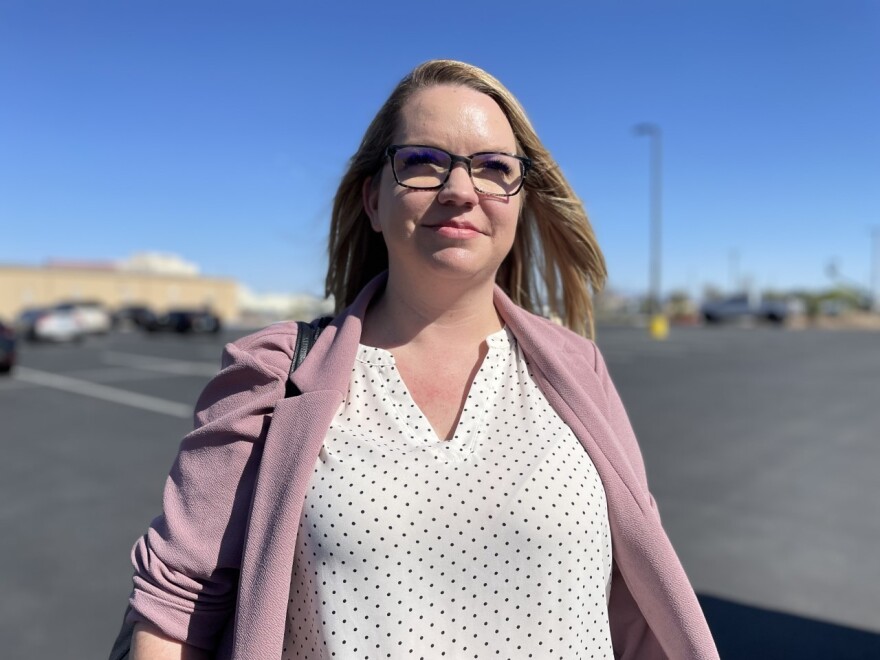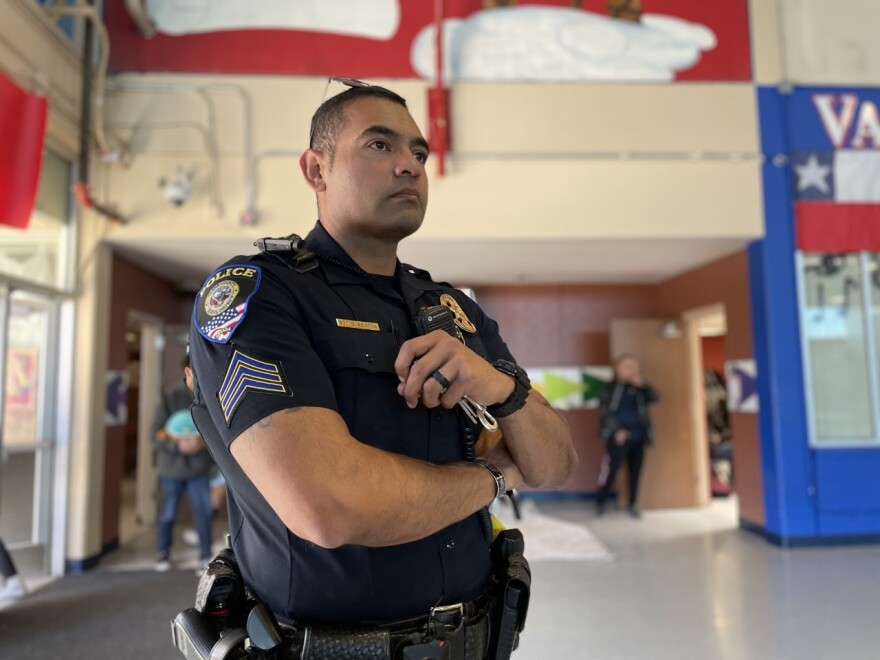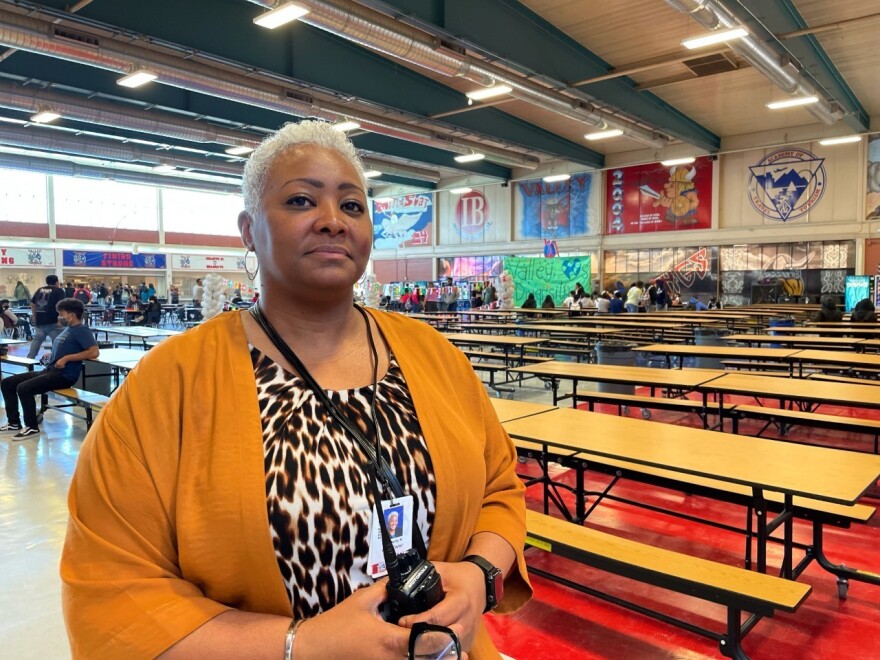After several days of classroom lockdowns when violent brawls broke out inside Desert Oasis High School in Las Vegas, Cherish Morgan had had enough.
She began organizing parents and students to pressure the Clark County School District to crack down on expulsions, demanding more security and training for teachers. On the second day of the fighting in early March, Morgan recalls standing outside the school on the sidewalk frantically texting her seventeen-year-old daughter who was trapped inside.
"It's terrifying when you're out here and you're like, I know where she is, I could just go grab her, she would be safer with me if I could just go get her," she said.
In one of the fights that was all over the local news, a father of a Desert Oasis student could be seen right in the middle taking swings.
"Listen, our principal and our teachers should not be jumping on top of a parent to stop him from beating a student," Morgan says. "There's no world where that is OK, there's just not."
In the world of Vegas, violence has long been a problem. The mafia put this town on the map, after all. But since the pandemic, things have been especially tense, with violent threats, harassment, theft, assaults and guns increasingly spilling into places many once thought safe.
Indeed, the trauma at Desert Oasis is hardly an isolated incident in the sprawling Clark County Schools District, the nation's fifth largest, home to some 305,000 students. District officials and police report an uptick in violence ever since returning to in-person learning last fall. There have been roughly 8,300 calls from Clark County schools to police dispatch reporting incidents of violence, up by some 1,300 compared to the entire 2018-2019 school year.
The most shocking attack in April involved a 16-year-old student who authorities say strangled his teacher and allegedly sexually assaulted her in her classroom during a dispute over grades. The student was charged with attempted murder.
Teachers are on edge and learning is being sidelined
While a recent national survey showed an uptick in harassment and violence against teachers, there's evidence it may be worse in Las Vegas. In interviews with staff, students and parents, many pointed to the fact that kids went into virtual learning for a full year and three months during the pandemic, causing a lot of social isolation. Las Vegas's economy has also been hit hard by the pandemic, with mass layoffs and shutdowns in the entertainment industry, so a lot of kids experienced added stress at home.
Many teachers say they don't feel like the district — or the broader community — have their backs. Locally, at least three martial arts studios have even begun offering free or reduced self-defense classes for CCSD teachers.
"When you're constantly having to worry about your safety and your students' safety and what's going on in the hallways, it's very difficult to just focus on teaching and focus on the students' needs in your classroom," says Ariane Prichard, a biology teacher at the city's Bonanza High School.

Prichard, a 14-year public education veteran, thought several times during this stressful school year that she might leave teaching all together. Burnt out and exhausted, she has decided to stay on but, for the first time, not teach summer school.
CCSD currently has at least 1,000 open teaching positions. At the start of the year, Prichard's classes were 40 deep. Teachers and administrators told NPR class sizes have gotten a little more manageable of late but only because more kids are truant. Still others appear to have dropped off the map all together.
Violent crime is also up generally in major cities
Sergeant Ben Abarca says he's seeing more truants on patrol in east Las Vegas. Some get into trouble on these streets or become victims themselves. One recent morning, dozens of kids were milling around in the back of one school near some modular classrooms. Across the road, in a church parking lot, several students were cutting class, hanging out and eating fast food.
"You guys go to Chaparral? Why are you not in class?" Abarca said, rolling his window down from his squad car. "Go on campus."

Abarca is with the CCSD Police Department — the district runs its own law enforcement agency separate from Las Vegas Metropolitan Police. His agency also is facing a shortage of officers since the pandemic, just as the violence has risen in both the schools and the city. In fact, violent crime is up across most major American cities.
"A lot of people like to blame the pandemic but the kids have been in school for over a year now," Abarca says. "I think it's a community issue and I think everybody has to do their own part, including us."
In Vegas, Abarca is seeing a lot more shootings. On patrol, he points out several that had occurred recently within feet of schools, including one elementary school. In black shades, Abarca is a tall hulk of a man, a former Marine who served in Iraq.
He's soft spoken but can look imposing, not the kind of guy you might want to talk back to, still: "I've been spat on, I've had a female pick up a pen and try to stab me with it like two weeks ago. I get punched, kicked. The respect isn't there like it used to be."
Abarca and other officials attribute some of this to a broader societal problem, declining trust in institutions and authority.
On this weekday morning, which he considers slow, there are some 20 active calls across the district. He scrolls through them on his laptop in his squad car: a fight at a middle school, another at a nearby high school, drugs at a middle school, threats made to an elementary school.
Abarca stops to interview a secretary who took that last threat, called in by a mom, who was apparently mad that her daughter was disciplined. She had demanded to know the address of the office and threatened to drive down, allegedly adding that she understood why "schools all get shot up."
Las Vegas schools went virtual longer than most
Sergeant Abarca later said he figured the mother calling in the threat has mental health issues. Nevada ranks last in the nation for mental health access. Its largest school district, Clark County, also frequently ranks near the bottom in education quality rankings. Nearly two thirds of the student population is considered lower-income.
"This is a ripe setting for these types of incidents," says Samuel Song, a school psychology professor at the University of Nevada Las Vegas.
There were 18 suicides during the one year and three months schools went all virtual.
"Do I think it was too long? We were doing everything we could at that time not knowing, not having a play book," says Jesus Jara, the CCSD superintendent.
Jara announced a slate of new safety measures after the 16-year-old student who attacked his teacher was charged with attempted murder and sexual assault. They include adding panic buttons in classrooms, more security cameras and tougher penalties for scofflaws as well as more mental health services.
Jara said the violence is a nationwide problem and it's not just in schools. So the challenge now is how to refocus students after so much upheaval and make sure they stay focused on learning.
"We can't measure how deep the scars are," he says. "This is why we have invested our extra dollars in mental health support not only for our students but also for adults."
But as the district tries to address the rise in violence, Jara says they also face a $6 billion deficit in maintenance and infrastructure. A new ad hoc group of parents and students is calling on Nevada's governor to hold a special legislative session to address the crisis. One candidate for governor has even pledged to "take over" Nevada's schools if elected due to the violence.
Eighteen-year-old student Gianna Archuleta had several family members lose their jobs in area casinos. She says her hometown is on edge. Violence has always been a problem in the schools here, but it's noticeably worse. She has started showing up at school trustee meetings demanding student-led solutions.
"Morale is low, people don't want to be here and it's honestly just incredibly sad to see because there are a lot of people here who could do a lot of good but they don't want to be in this environment anymore because of what's happening," Archuleta says.
Things appear to be calming down, some
The district is using federal Covid relief funds to go toward a $4,000 teacher recruitment package to address the staffing shortage. They're also trying to offer retention bonuses for beleaguered staff. District officials have said the violence tends to be perpetrated by small groups of students. Meanwhile, they say things have quieted down some as the end of the school year approaches.
At Valley High School, east of the Las Vegas strip, teachers and support staff are trying to focus on the positives, scheduling fun activities for several straight days marking teacher appreciation week. During a crowded lunch period, mariachi music played for Cinco de Mayo.
"It seems as though students aren't socially interacting with adults or themselves in the way that we saw pre-pandemic," says Kim Perry-Carter, the principal. "There's a lot of anger and there's a lot of quick tempers."
But she pointed to some of her most troubled kids who recently returned to school who were out on the cafeteria floor dancing. Some students even dressed in costumes. She says many badly need some sense of normal, some stability.

"We have three social workers on our campus — phenomenal social workers — but those three social workers can't reach 2,800 students. And I will say out of all 2,800 students, it's a small group of students that are causing problems," she says.
Copyright 2023 NPR. To see more, visit https://www.npr.org.




